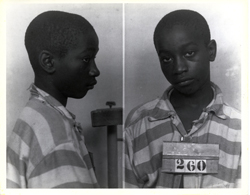Library Council Awards Grant to University Libraries’ Special Collections to Develop Access to National Death Penalty Archive
ALBANY, N.Y. (January 24, 2014) -- The University at Albany Libraries’ M.E. Grenander Department of Special Collections & Archives has been selected to receive a 2013 Cataloging Hidden Special Collections and Archives grant from the Council on Library and Information Resources (CLIR) for its project Building New Access Tools for the National Death Penalty Archive (NDPA).The $119,900 grant will support an arrangement and description program that will enhance access and discoverability of research material in the University at Albany Libraries’ National Death Penalty Archive (NDPA). The grant project will be directed by principal investigator Brian Keough, Associate Librarian and Head of Special Collections & Archives.
 |
|
National Death Penalty Archive photo of fourteen-year-old George Stinney Jr., electrocuted in 1944 in Clarendon County, South Carolina, one of the youngest persons to be executed in the United States in the 20th Century.
|
The grant project provides funding for a full-time archivist to arrange, describe and catalog 710 cubic feet of NDPA collections over eighteen months, resulting in the completion of bibliographic records and of Encoded Archival Description finding aids that will be searchable utilizing the eXtensible Text Framework (XTF), an open source platform providing robust access to EAD finding aids. This grant will result in scholars gaining increased access to historical resources, help teachers develop learning-centered curricula, and offer researchers the full benefits of XML in retrieval, access and display. The project will improve access to many of the NDPA’s nationally significant collections including the official records of the National Coalition to Abolish the Death Penalty, the David Baldus Papers, and the Capital Jury Project interviews with more than 1,200 jurors from 353 capital trials in 14 states.
The NDPA mission is to build a collection of archival materials from individuals and national organizations that played substantive roles in the history of capital punishment. Through a partnership between the School of Criminal Justice and the Library that began in 1999, the NDPA has acquired personal papers and organizational records to document the emergence, development and coordination of a political and social movement related to the death penalty. The NDPA collections present a comprehensive picture of political debate, reform, legal maneuvering and academic research from nationally recognized experts on legal executions in the United States. Scholars gain access to primary sources that provide insight into the process, influence and interplay of academic scholarship and political debate over capital punishment. The NDPA contains primary sources in compelling thematic areas, such as civil rights, advocacy efforts of victims' families and legal history as well as research examining challenges to the death penalty's constitutionality, deterrence, wrongful convictions and sentences for capital crimes.
CLIR is an independent, nonprofit organization that forges strategies to enhance research, teaching, and learning environments in collaboration with libraries, cultural institutions, and communities of higher learning. In 2008, CLIR started the Cataloging Hidden Special Collections and Archives initiative to help libraries, archives, and cultural institutions describe and catalog millions of items that have never been adequately described and remain inaccessible to scholars. The program supports innovative, efficient description of large volumes of archival collections that are unknown and inaccessible to scholars, yet contain substantive intellectual value. With the support of The Andrew W. Mellon Foundation, eighty-seven grants totaling nearly $20 million have been made to a variety of institutions nationwide.
![]() For more news, subscribe to UAlbany's RSS headline feeds
For more news, subscribe to UAlbany's RSS headline feeds
A comprehensive public research university, the University at Albany-SUNY offers more than 120 undergraduate majors and minors and 125 master's, doctoral and graduate certificate programs. UAlbany is a leader among all New York State colleges and universities in such diverse fields as atmospheric and environmental sciences, business, education, public health,health sciences, criminal justice, emergency preparedness, engineering and applied sciences, informatics, public administration, social welfare and sociology, taught by an extensive roster of faculty experts. It also offers expanded academic and research opportunities for students through an affiliation with Albany Law School. With a curriculum enhanced by 600 study-abroad opportunities, UAlbany launches great careers.


